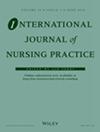Validity and Reliability of the Korean Version of the Self-Care Self-Efficacy Scale for Patients With Heart Failure: A Psychometric Evaluation
Abstract
Aim
The psychometric properties of the 10-item Self-Care Self-Efficacy scale have not yet been established in the Korean language. This study aimed to evaluate its validity and reliability among Korean patients with heart failure (HF).
Methods
A total of 159 patients with HF participated (mean age: 65.40 ± 9.62 years; 60.1% male). Construct validity was assessed using confirmatory factor analysis. Criterion validity was examined by assessing the correlation of self-efficacy with HF symptom status and physical function and by comparing self-efficacy levels across the New York Heart Association classes. Reliability was evaluated using Cronbach's alpha, McDonald's omega and factor determinacy.
Results
Confirmatory factor analysis fit indices were as follows: comparative fit index = 0.977, Tucker–Lewis index = 0.966, standardised root mean square residual = 0.041 and root mean square error of approximation = 0.065 (90% CI = 0.038–0.090). Criterion validity was supported by significant correlations between self-efficacy and symptom status (r = −0.331, p < 0.001) and physical function (r = 0.299, p < 0.001). Self-efficacy scores were significantly higher in patients with lower New York Heart Association class (I/II) than higher class (III or IV) (F = 4.68, p = 0.011). Reliability estimates were robust: Cronbach's α = 0.913, McDonald's omega = 0.902 and factor determinacy = 0.941.
Conclusion
This study supports the validity and reliability of the Self-Care Self-Efficacy scale in Korean for assessing self-care self-efficacy among patients with HF. Clinicians should consider evaluating and enhancing patients' self-care self-efficacy to effectively manage HF symptoms, especially considering functional severity.

 求助内容:
求助内容: 应助结果提醒方式:
应助结果提醒方式:


